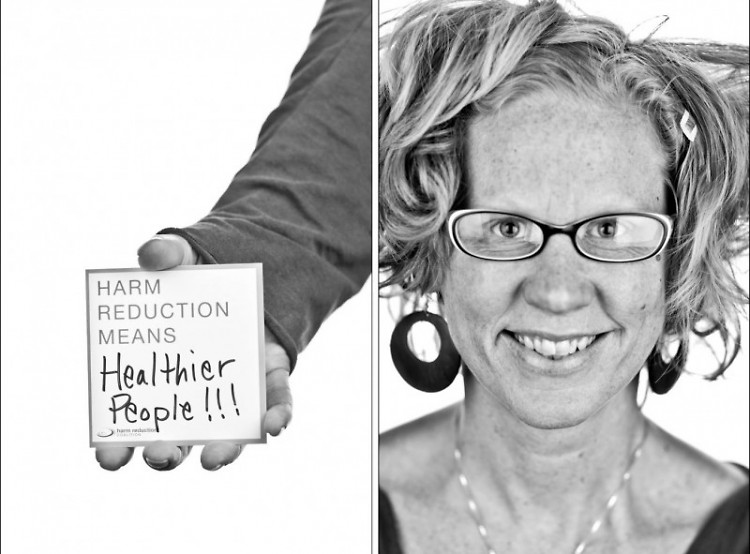
When I dove into work with our homeless communities 15 years ago, I began to understand that another way of helping our neighbors dealing with homelessness and drug addiction is needed- one based on science, compassion, health and human rights.

In the fall of 2014, I attended the Harm Reduction Conference in Baltimore /Courtesy of Tami VandenBerg

Dr. Carl Hart, renowned researcher on addiction that we brought to Wealthy Theater last year. /Courtesy of Tami VandenBerg
In the year 2000, I landed my first "real job." I became a Case Manager at The Salvation Army Homeless Assistance Program. My job was to work with the people who were continuously coming back to the shelters for help, people who had been in and out of almost every human service system a few times. My clients, mostly women and families, had many struggles including mental health issues, physical health issues, extreme poverty, chronic unemployment and addiction, to name a few. Many were deemed "chronically homeless," which make up about 15 percent of the total population of those in shelters and on the street.
Many of my clients used substances in a problematic way. As I began to try and understand this issue and how to best help my clients, I was met with a system filled with contradictions. We were told that addiction was a disease, but people were arrested if they were caught using or in possession. Why were we arresting people with a disease? We were told that people were powerless over this disease, and we were told that substance use was a choice. Well which was it? The mental health system would not touch anyone who was using, even though many were self-medicating for an untreated mental health issue. The substance abuse system wanted everyone to address their mental health issue first before they could get help with their addiction. Some people were dealt with in the criminal justice system leaving them with felonies on their record for this disease. Others were sent to treatment facilities. Everyone was told to go to NA or AA. We were told our clients needed to "get clean" before they could have housing. How were they supposed to stop using while living on the street?
At times, people finding themselves on the street would increase their usage or try new substances to ease the pain of not having anywhere to go. Being homeless often led people to use street drugs to self-medicate as the medical system was difficult to access. My clients did not want to talk about their drug use with most people as they feared arrest. How were people supposed to get better if they could never be honest about their life without fearing arrest? Anyone who questioned the status quo was accused of enabling our clients.
When I dove into this work, I had no idea where the journey would take me. I built strong relationships with the women and worked to gain their trust. Their stories were heartbreaking. Many of the women had lost custody of their children, were about to lose custody, were working on getting their children back or had completely given up on ever seeing their children. Between the physical and sexual assaults they had endured, the extreme poverty, the occasional sex work and the abject lack of opportunity, the fact that some of these women were still standing was a damn miracle. I felt honored to have the opportunity to try to help them make their lives even a little better.
But the game was rigged.
My clients would constantly be told that they needed help, and they would often try to get it, but there were massive systemic issues at play. Treatment facilities never had enough beds. If you could not get a bed at a detox, you would likely end up in jail. We lost people to overdose – intentional or accidental. We lost people to prisons. Many folks managed to either stop or manage their drug use, often on their own or with help from friends and family, but then were excluded from 90 percent of affordable housing and employment opportunities if they had a felony. Without purpose and without a place to live, I would watch people return to chaotic use. It was just brutal, ineffective and outrageously costly to taxpayers. Some folks made it out, and it was miraculous.
When I worked at Community Rebuilders I was introduced to the Housing First Model, which made so much sense to me. This model is based on the fact that housing is the primary need for people who are homeless, and any other needs should be addressed after permanent housing is secured.
In 2006 I attended my first National Harm Reduction Conference in Oakland, California. Harm Reduction is a set of practical strategies and ideas aimed at reducing the negative consequences associated with drug use. Harm Reduction is also a movement for social justice built on a belief in, and respect for, the rights of people who use drugs. I was quickly drawn into this movement in a massive way.
I knew people that were volunteering at the local harm reduction syringe exchange, CleanWorks. While it took me a minute to wrap my head around giving needles to people who injected drugs, I quickly thought back to some of the women I knew who had contracted HIV through a dirty needle, and it didn't take me long to realize this was something I wanted to support. In my experience, and according to most reliable data, chaotic drug users eventually stop using chaotically, and we need to keep them as healthy as possible in the meantime. These are people's kids, parents, brothers and sisters. Within in a short period I joined the board of the Red Project, the organization that ran CleanWorks. Soon I was chairperson of the board, and I was a committed harm reduction practitioner. I worked very hard to grow the organization.
In 2009 I attended my first National Drug Policy Reform Conference in Albuquerque, and I felt like someone finally gave me the missing pieces of the puzzle. I had been acquiring the pieces for years, trying to make sense of a real solution for these folks chronically left behind, and finally things began to make sense. The Drug Policy Alliance is the nation's leading organization promoting drug policies that are grounded in science, compassion, health and human rights. Our current drug policies are not grounded in science or logic.
SCIENCE! COMPASSION! HEALTH! HUMAN RIGHTS! These were my people! I finally found them! I have been studying Harm Reduction and Drug Policy Reform ever since, and I have been taking action. I helped expand the Red Project, fought for decriminalizing cannabis in GR (and we won!), and I am now director of Well House, a housing organization that practices Harm Reduction and Housing First. I have learned that our drug policies not only do not help those with addiction struggles, but they have been disastrous to many of our poor communities of color, have resulted in a society with the largest percentage of its citizens in prison in the world and have destroyed relationships between law enforcement and our poorest neighbors leading to entire communities never cooperating with police investigations.
I believe the evidence shows that drug use is a health issue and must be removed entirely from the criminal justice system. We do not imprison those with diabetes or cancer or heart disease. Those with enough money can access science-based drug treatment. We continue to imprison poor people, primarily people of color, destroying their opportunity to build a life with meaningful work, safe housing and custody of their kids. It's messed up and it's wrong.
This is a conversation our community needs to be having. So on May 14 we are bringing in two of the country's leading Drug Policy Reformers: Ethan Nadelmann and Major Neill Franklin. Come and join the conversation.
The Rapidian, a program of the 501(c)3 nonprofit Community Media Center, relies on the community’s support to help cover the cost of training reporters and publishing content.
We need your help.
If each of our readers and content creators who values this community platform help support its creation and maintenance, The Rapidian can continue to educate and facilitate a conversation around issues for years to come.
Please support The Rapidian and make a contribution today.